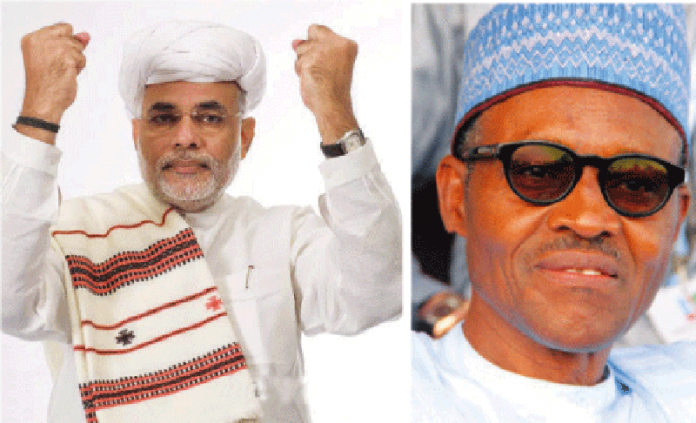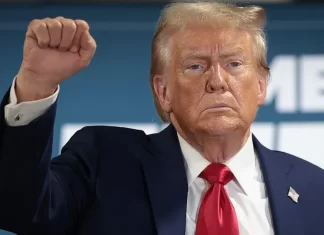Acting News Editor, ISHAYA IBRAHIM, examines the relevance of President Muhammadu Buhari’s several diplomatic shuttles, the latest being to India.
President Muhammadu Buhari’s diplomatic shuttle to India makes it the eight of such foreign trips he has made in the last five months of his presidency, canvassing the twin problem of security and economy beleaguering the country in such multilateral and bilateral fora.
India is the second most populous country with over 1.2 billion people, eight times the size of Nigeria. Yet, the balance of trade between the two favours the South Asian country.
A 2014 report by the Sovereign Investment Authority of Nigeria had it that 30,000 Nigerians spend $1 billion annually on medical tourism alone. Of the sum, 60 per cent is spent on the four major areas of cardiology, orthopaedic, renal dialysis issues and cancer.
Mahatma Gandhi’s country is also a major exporter of pharmaceuticals, agricultural machineries and home utensils to Nigeria.
On the Nigerian side, oil and gas constitute 91 per cent of its total exports to India.
So, the just ended India-Africa Forum Summit, the third since it started in 2008, provided the perfect platform for Nigeria to seek a large chunk of India’s market, especially as the Buhari administration is talking about diversification from oil and gas into agriculture, given the free fall in the price of the black gold.
Closing the deal with India
President Buhari met the Prime Minister of India, Narendra Modi, on Thursday, October 29, deliberating on issues mutually beneficial to both countries. He also met chief executive officers of Indian companies with existing or prospective interests in Nigeria before returning to Abuja on October 30.
Buhari was accompanied by the Governor of Kano State, Abdullahi Ganduje of the All Progressives Congress (APC), and that of Delta, Ifeanyi Okowa of the Peoples Democratic Party (PDP), as well as the National Security Adviser (NSA), Babagana Monguno, to New Delhi. Others on the president’s entourage include permanent secretaries in the Ministries of Defence, Power, Communications Technology, Agriculture, Foreign Affairs and Industry, Trade and Investment. The team was prospecting new business frontiers and wooing foreign investors into Nigeria.
India reportedly generates about 350,000 megawatts (MW) of electricity, while Nigeria had been battling to up hers to 10,000MW for years on end. The former is said to have thrown its doors ajar for the latter whose economy is muzzled by epileptic power supply. This summit was expected to provide a fresh platform for Nigeria to tap into India’s template to fix its electricity problem.
Unnecessary foreign trips
Critics believe the foreign trips of the president were necessary.
Presidential candidate of United Democratic Party (UDP) in the last general election, Godson Okoye, was blunt.
His words: “Why do we have to wait for foreign investors before we can operate our economy? How many foreign investors did Singaporeans get before they started their economy? How many foreign investors did Indonesians get before they operated their economy and now they are doing well!
“They (Nigerian leaders) must get approval from foreigners before they know that they are doing the right thing. Do something right for your own country for goodness sake!”
First place to tour
Since Buhari became president, he has only visited one state in Nigeria on official visit, which is Cross River where he commissioned a 260-kilometre superhighway.
So far, the president has toured eight countries following his inauguration on May 29 in a bid to foster economic and security ties.
Few weeks into office, he visited Niger, Chad and Cameroon on bilateral talks on how to arrest the menace of Boko Haram with the Nigerian neighbours.
The president was also in Munich, Germany for a two-day official visit in the course of which he participated in the G-7 Outreach programme for invited heads of government and global institutions. There, he submitted Nigeria’s wish list to the world leaders which included security cooperation and investment in electricity projects. He was accompanied by Governor Kashim Shettima of Borno State; former Governor of Lagos State, Babatunde Fashola; former Chief of Army Staff (COAS), Abdulrahman Dambazau, now a ministerial nominee who is likely to be the defence minister; and the Permanent Secretary of the Ministry of Foreign Affairs, Ambassador Paul Lolo.
Other countries visited by the president included South Africa for the 25th Africa Union (AU) Summit, France and the United States.
Okoye is not impressed. “Did Americans vote for Buhari? Did the Europeans vote for him? Nigerians voted for him! Wouldn’t it have been a better thing for him to do a tour of the country after swearing-in?
“Nobody can love your country better than you, no matter how we pretend. They will only take what they want and then walk off.
“At least if you don’t tour state to state, you tour zone to zone. Thereafter you go abroad. But our charity begins abroad because these are people that are suffering from colonial mentality. If Britain does not approve of what they are doing, they are not comfortable. If America doesn’t approve of it, they are not comfortable.
“You only need to operate Nigeria in the way that suits Nigeria. But because they (political leaders) believe in outside endorsement, nobody believes in Nigeria’s endorsement,” the UDP stalwart said.
Foreign trips, strategic
Dr. Tunde Oseni, Lecturer at the department of Politics and International Relations, Lead City University, Ibadan, said the foreign trips undertaken by the president were necessary and effective.
“What Buhari is doing is not unique. When a government is new, it will seek friendship in the nature of foreign direct investment (FDI), security, etc. In comparison, former President Olusegun Obasanjo travelled more when he was elected president than Buhari.
“It is not the travel, but the purpose of the travel. All the travels of the president have been necessitated by the need to promote the security and economy of the country,” he added.
He said what Buhari is doing is shuttle diplomacy; a president visiting another president. “Even if we have a foreign minister, such visits are more effective.”
He explained that the Africa-India Forum Summit was a strategic partnership for improved business relations between the African continent and India.
“For India to agree to host Africa, it must have strategic benefit. It has a population of more than one billion. Africa has less of that population. India is an emerging economy. It is looking for access to resources. If the United States can host African heads of state, there is nothing stopping India,” Oseni added.













